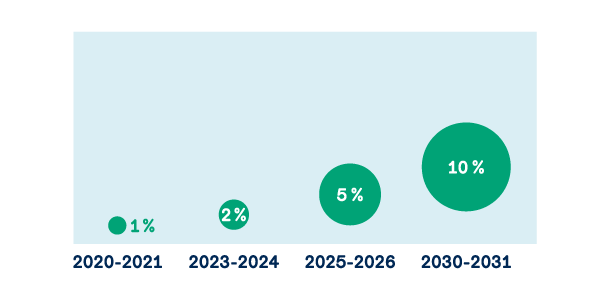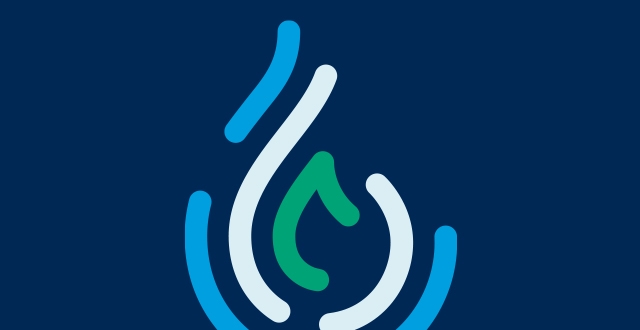RNG: a growing part of Énergir’s gas supply
Énergir is working to help decarbonize Quebec and the energy distributed throughout its grid largely by focusing on RNG, which is 100% renewable energy. We also back Quebec’s regulatory targets for RNG delivery.
Regulatory targets
- 1 % RNG in 2020-20211
- 2 % RNG in 2023-20241
- 5 % RNG in 2025-20261
- 10 % RNG in 2030-20311
Our customers voluntarily purchase RNG. If voluntary RNG purchases exceed the threshold set by the government, it will further reduce Quebec’s fossil-based GHG emissions.
On the other hand, if our customers’ RNG purchases do not meet the regulatory target, Énergir must allocate the costs of unsold volumes as part of the socialization fee.

Benefits of RNG
For you
- Keep the same appliances: you can continue to use your existing gas appliances (you don’t have to replace them).
- Use it to do the same things: RNG is interchangeable with fossil-based natural gas and serves the same purposes (cooking, heating, etc.).
- Support the energy transition by choosing to buy renewable energy.
For society
- Leverage the value of the gas grid: RNG molecules and fossil-based natural gas molecules are interchangeable, so RNG does not require infrastructure change and simply flows through the same pipes.
- Organic waste is diverted: RNG production converts methane produced by decomposition of organic waste into renewable energy. Also, in some cases, it prevents methane emissions from this decomposition into the atmosphere.
- We're banking on more renewable energy: We’re progressively replacing fossil-based energy for renewable energy, which helps reduce GHG emissions from fossil fuels. That’s why, as part of the Plan for a green economy, the Government of Quebec has adopted RNG regulatory targets.
You can make a difference
You can choose to purchase a percentage of RNG to partially or fully (from 1% to 100%) replace the fossil natural gas you purchase with renewable energy.It’s quick, it’s easy, and you can change your selection from your Customer Space.
Join us in supporting the energy transition: purchase RNG.
Understanding your RNG purchase
When you purchase a percentage of RNG, you replace part of your purchase of fossil natural gas with an equivalent quantity of renewable energy, and you contribute to the fight against climate change. To understand your purchase, watch this video.
And to learn more about the impact of your RNG purchase on Quebec's GHG emissions, consult our Q&A below.
When you purchase renewable natural gas, you’re helping to improve your GHG balance because your purchase of RNG replaces the purchase of an equivalent amount of fossil natural gas.
Because RNG and fossil natural gas circulate in the same North American gas distribution system, their molecules mix completely, making it impossible to confirm the exact quantity of RNG molecules that reach your devices. While we cannot necessarily deliver to you the quantity of RNG you purchased, your share is exclusively attributed to you and is reflected on your bill. Your purchase of RNG helps improve your GHG balance by reducing the GHG emissions targeted by the fight against climate change.
In addition, Énergir guarantees that the total amount it procures from RNG producers is greater than the quantity purchased by all its customers, as verified by the Bureau de normalisation du Québec.
For more information on GHG emissions from renewable natural gas and how to account for them in your GHG balance according to recognized GHG emissions quantification standards such as ISO 140064, see the questions and answers on our website: “Does RNG emit GHG emissions?” “How are GHG emissions from RNG combustion accounted for?” and “How do RNG purchases impact Énergir customers?”
Yes, if it’s produced from a renewable source. There are five main sources of renewable energy: the sun, wind, water, the earth (geothermal energy) and organic matter. Organic waste is used in the case of renewable natural gas (RNG). Things like table scraps, wastewater, manure and agricultural slurry all have very short renewal cycles.
To meet regulatory targets for RNG deliveries, Energir sources most of its RNG from producers in North America. It is working to increase its supply from producers in Quebec. The quantity of RNG purchased by Energir from each producer is injected by the latter into the gas network of the region where the producer is located. It can therefore be injected into the gas network of Energir or another distributor in North America, and then mixed with the fossil natural gas circulating in the same gas network. The gas molecule or electron is consumed by the various users connected to these networks. The quantity of RNG purchased by Énergir reduces the quantity of fossil natural gas that Énergir buys as part of its overall supply.
To find out more, see the question "What confirms that my RNG purchase is correctly applied to my home?”
There is no way to confirm the exact amount of purchased RNG that is delivered to your devices, since RNG and fossil natural gas flow through the same gas network and the molecules mix together. The same applies to electricity that is purchased: you can’t tell which dam or wind turbine generated the electrons that are lighting your home.
The quantity that is voluntarily purchased by a customer differs from the quantity that is physically transported to the customer’s devices.
Énergir has put in place rigorous measures to regularly confirm that its total supply from RNG producers corresponds to the quantity purchased by all its customers as a replacement for fossil natural gas. After the end of a year, Énergir has its RNG supply and inventory verified by the Bureau de normalisation du Québec (BNQ).
Your purchased RNG volumes are shown on your detailed bills for total natural gas consumption.
You can request a change to your renewable natural gas purchase at any time. As a customer, for an effective date of the first of the following month, you must submit your request no later than the 20th of the current month. Requests received after the 20th of the month will be processed with the following month’s requests. The change request is made directly in your Customer Space by specifying the revised purchase percentage and desired effective date.
It is a charge that spreads the costs associated with the volume of RNG to meet the regulatory obligation and that is unsold among customers likely to make purchases. Energir has a regulatory obligation to deliver a certain amount of RNG in its system. When a portion of this RNG is not voluntarily purchased by its customers, Énergir must socialize the cost of the unsold volumes among customers who have not purchased the quantity of RNG from the regulatory threshold (i.e., 2% in 2023-2024, 5% in 2025-2026 and 10% in 2030-2031).
Énergir has a regulatory obligation to deliver a minimum amount of RNG during its fiscal year (2% in 2023-2024, 5% in 2025-2026 and 10% in 2030-2031). If customers do not voluntarily purchase a portion of that RNG, Énergir has to socialize the cost of the unsold volumes among customers who do not purchase the minimum quantity required by regulations. Thus, if demand from voluntary customers does not exceed the regulatory threshold regarding the quantity of RNG to be delivered, voluntary purchases will not impact the reduction of GHG emissions in Québec attributable to RNG. Conversely, if voluntary purchases exceed that regulatory threshold, they enable a further reduction of GHG emissions from RNG with respect to Québec.
RNG combustion is not emission-free; it generates GHG emissions (CO2, CH4 and N2O) in the same way as the combustion of fossil natural gas. CO2 is the main GHG that is generated (over 99% of combustion emissions). However, unlike the emissions resulting from the combustion of fossil natural gas, CO2 emissions from RNG combustion are not included in emissions targeted by the fight against climate change. Fossil natural gas combustion releases CO2 that has been sequestered for millions of years in geological formations. In contrast, the CO2 released into the atmosphere from RNG combustion (known as biogenic CO2) was sequestered in organic matter (food waste, manure, wastewater, etc.) that renews much more rapidly. Biogenic CO2 was therefore in the atmosphere not so long ago, was absorbed by organic matter, and will be re-absorbed. The effect of biogenic CO2 on the climate depends on a variety of factors, including the source of organic waste.
Although also biogenic, N2O and CH4 combustion emissions (less than 1% of combustion emissions) from RNG must be reported in the direct emissions (Scope 1 emissions) of the person or entity using RNG in their GHG inventory.
The biogenic CO2 emitted during combustion must also be quantified, but reported separately from Scope 1 emissions in the GHG inventory. Regulations governing the GHG cap-and-trade system (CATS) stipulate that these CO2 emissions must be reported, but do not have to be covered by emission allowances under Quebec’s GHG cap-and-trade system.
In contrast, all GHG emissions (CO2, CH4 and N2O) from fossil natural gas combustion must be reported in the direct emissions (Scope 1 emissions) of the person or entity using fossil natural gas in their GHG inventory.
RNG production emits GHGs. GHGs are also emitted during RNG transmission and distribution.
1. Targets listed are based on Énergir’s fiscal years. Énergir’s regulatory obligation is to deliver a certain amount of RNG during its fiscal year.

